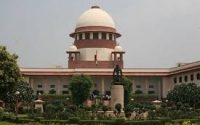Unjustly Jailed For 23 Years, Ali Mohammed Bhat Returns To Parents’ Grave
Source: ndtv.com
SRINAGAR:
Twenty-three years after he was accused of terror attacks in Delhi and Rajasthan, branded a terrorist and left to rot in prison, 48-year-old Ali Mohammad Bhat returned home to Srinagar, only to find his parents had died of heartbreak while he languished in jail for a crime he never committed.
Bhat had on Monday been acquitted by the Rajasthan High Court in the matter of the Samleti village blast. The decision came seven years after the Delhi High Court acquitted him in connection with the 1996 Lajpat Nagar blast.
Videos of Bhat, now 48 years old, sobbing helplessly on his return home over the graves of his mother and father have gone viral. And as Bhat, dressed in a faded whit kurta, is dragged away from his parents’ grave and reacquainted with his once-destroyed life, it would not have come as a surprise to find him angry. Surprisingly, he is not even bitter.
“When I got stuck in this case, that is when I realised we are being oppressed and this is not right. You may become a victim, but never become an oppressor,” he told NDTV. “I had thought I will die in the jail until court finally declared me innocent,” he quietly added.
On May 21, 1996, thirteen people were killed in a blast in Delhi’s Lajpat Nagar. After an investigation that lasted three months, Delhi Police filed a chargesheet against 10 people, including Bhat.
Then a young man full of dreams, he was arrested selling carpets in neighbouring Nepal, and also charged for the blast in Samleti village in Rajasthan, in which 14 people died. Found guilty in both cases, he was sentenced to death in one and life in prison for the other.
However, behind the scenes of an apparently successful police investigation, there were lapses in protocol that led to Bhat’s acquittal, albeit nine years after the conviction and appeal.
“Police has not maintained minimum standard of probe in the case. Test identification parade was not conducted, statement of vital witnesses were not recorded. There was also absence of ‘Delhi Diary’ entry in the case,” the Delhi High Court said in November 2012, taking the authorities to task as they released Bhat and one other accused.
The Rajasthan High Court acquitted Bhat earlier this week after the prosecution failed to provide evidence of a conspiracy and link between him and main accused Dr Abdul Hameed.
Bhat returned home a free man, but one who had more than two decades of his life stolen from him.
“I was missing everyone here. The people and relatives I knew, many of them have died in last 23 years. Everything has changed here,” he said, adding that he deeply regretted not being given the chance to say farewell to his parents; his mother died in 2002 and his father three years ago.
Now back home, his challenge is to start from scratch, adjust to everyday life and to an almost new family. He also has advice for the youth of Srinagar and Jammu and Kashmir, urging them to “never resort to violence that can lead to the death of an innocent person”.
The larger question now is – will anyone be held responsible for framing Ali Mohammed Bhat and will the government, acknowledging that it has ruined his life, offer him compensation?



